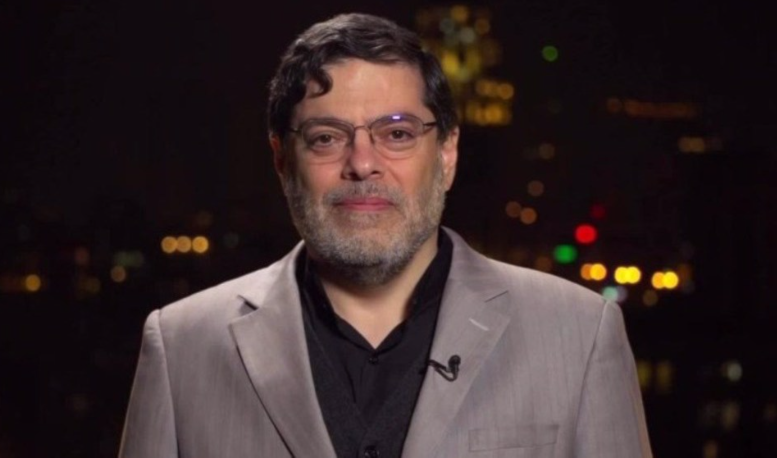Strategic ambiguity of nuclear program gives Iran advantage: Marandi
Iran has gained strategic leverage as IAEA cooperation has been put to a stop, Europe isolates itself, and Russia and China reject snapback sanctions, Professor Marandi explains to Al Mayadeen.
-

Professor Seyed Mohammad Marandi speaks in an interview with Al Mayadeen on September 25, 2022. (Screengrab)
Iran has turned a challenging diplomatic confrontation with the West into a strategic advantage, according to political analyst and Tehran University Professor Seyed Mohammad Marandi, who criticized the recent escalation surrounding the revival of UN Security Council nuclear sanctions.
In an interview with Al Mayadeen, Dr. Marandi delved into Tehran's decision to halt all cooperation with the International Atomic Energy Agency (IAEA), attributing the move to its politicized nature, alignment with Western powers, and those powers' support for the Israeli attacks on Iran and its nuclear facilities back in June.
According to Marandi, the move has significantly shifted the balance in Iran's favor, further clarifying that with the cessation of cooperation with the IAEA, "Iran's nuclear program now has a strong element of strategic ambiguity. That is very hurtful for the West. It creates concern for them."
In an interview for Al Mayadeen, Tehran University Professor Seyed Mohammad Marandi argued that Iran’s decision to scale back cooperation with the IAEA has created “strategic ambiguity” in its nuclear program, a move he says has unsettled the West.
— Al Mayadeen English (@MayadeenEnglish) September 23, 2025
He adds that Europe has lost… pic.twitter.com/ZAmihU6cOg
Miscalculation by the West
Marandi asserted that Western-backed attacks on Iran, including those by the Israeli regime, along with the IAEA’s failure to condemn such acts, have left Iran with no incentive to maintain cooperation.
“The very fact that the Israeli regime attacked Iran with the support of the West, and the fact that the United States struck Iran... all of that has allowed Iran to stop cooperating,” he noted, calling it a “major miscalculation” by Washington and Tel Aviv.
He also criticized the IAEA’s statement following these attacks, slamming it as an attempt to justify aggression by the Israeli regime.
On Europe’s waning influence
Highlighting the European Troika's (E3) efforts to trigger the snapback mechanism, Dr. Marandi argued that this move effectively ends any remaining leverage Europe held over Tehran.
“Once the snapback mechanism has been used, Europe is no longer of any importance to Iran,” he said, describing the E3’s actions as a culmination of long-standing non-compliance with the 2015 nuclear deal. “They never intended from the beginning in 2015 to abide by their commitments.”
Marandi further explained that Europe’s increasing isolation on the global stage, from the war in Ukraine to confrontations with China and now Iran, leaves it heavily dependent on the United States.
He also emphasized Europe’s inability to access Iranian or Russian energy or resume robust economic cooperation with China, as indicators of its diminishing global role.
Limited economic impact
Simultaneously, Marandi dismissed the practical impact of the reimposition of nuclear sanctions on Iran and its economy.
“These resolutions are limited to Iran's nuclear and military programs, which are largely indigenous,” he stated.
In this context, he emphasized that Iran continues to cooperate with major global players such as Russia and China, who have jointly declared the snapback move illegitimate.
“That blunts the knife that is in the hands of the European Union,” he said, referencing the recent joint statement by the Iranian, Russian, and Chinese foreign ministers.
How Iran proved the West's unfounded hostility
While Iran had reached an agreement with the IAEA in Cairo, Dr. Marandi explained that this was meant to signal Tehran’s goodwill to the Global South, not as a concession to Western powers.
He additionally framed Iran's positioning as a victim of Western violence, clarifying that Tehran had continued negotiating with the United States and the E3 despite knowledge of Israeli conspiracies to attack its nuclear facilities.
Moreover, the Cairo deal with the IAEA had also been a show of willingness to cooperate; however, the European trio maintained pressure and raised the matter at the UNSC, further placing the West in a position of offense, and Iran in that of defense.
'The future is Asia'
According to Dr. Marandi, the broader geopolitical context favors Iran’s eastward pivot. He cited decades of Western hostility, including sanctions, the support for Saddam Hussein during the Iran-Iraq war, and backing the Israeli regime, as failed efforts to weaken Tehran.
“The future is Asia... the rise of China is evident for all,” he stated, asserting that Iran’s strategic focus should lie with the East, not the West.
He concluded by noting that Western support for the Israeli regime and aggression in Gaza has only served to reaffirm Iran’s position on the global stage, especially in the Global South.
“Iran’s support for the Palestinian people and the Resistance in Gaza and across West Asia is unwavering,” he said, asserting that this principled stance has earned Iran international credibility despite ongoing Western pressure.
Read more: Iran MP urges shift in defense doctrine, calls for nuclear 'deterrent'

 5 Min Read
5 Min Read








